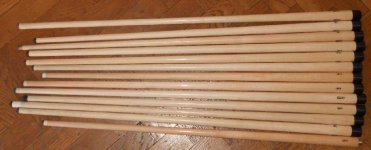I am curious as to how many of you make thinner shafts in solid wood.
The reason I ask is this - I just acquired a Schön R-5 that came with an original shaft that is at 12 mm. Previous to this I have always shot with something in the 12.5-12.9 range. I really like the smaller shaft diameter.
This got me thinking, Predator makes the Z shafts at 11.75 and most of the other major manufacturers also offer some sort of skinny shaft, and the majority come with a euro taper instead of pro, which I assume is to reduce 'whippiness' - and the people that use them seem to like them.
Yet I never seem to see any cues or shafts for sale made of solid wood in this diameter range. Is this because no one wants them? or no one sells them? or are they a specialty item because you need to do a more aggressive taper? (or as I just thought of - are they considered billiards or snooker shafts at that point?)
Ultimately I am asking because I am considering getting another shaft made and am toying with the idea of a more conical taper, smaller diameter. Is this something most of you do - or am I going to have problems?
Thanks in advance for any input.
The reason I ask is this - I just acquired a Schön R-5 that came with an original shaft that is at 12 mm. Previous to this I have always shot with something in the 12.5-12.9 range. I really like the smaller shaft diameter.
This got me thinking, Predator makes the Z shafts at 11.75 and most of the other major manufacturers also offer some sort of skinny shaft, and the majority come with a euro taper instead of pro, which I assume is to reduce 'whippiness' - and the people that use them seem to like them.
Yet I never seem to see any cues or shafts for sale made of solid wood in this diameter range. Is this because no one wants them? or no one sells them? or are they a specialty item because you need to do a more aggressive taper? (or as I just thought of - are they considered billiards or snooker shafts at that point?)
Ultimately I am asking because I am considering getting another shaft made and am toying with the idea of a more conical taper, smaller diameter. Is this something most of you do - or am I going to have problems?
Thanks in advance for any input.
